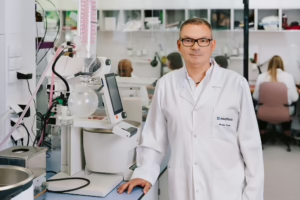Polish technology company Noctiluca has announced is advances in OLED display technology with its new proprietary material NCEIL-4, which the company claims has demonstrated remarkable improvements in blue pixel performance during laboratory tests in Korea. NCEIL-4 has shown the ability to extend blue pixel lifespan by up to 15 times while simultaneously reducing power consumption, addressing two critical challenges that have long plagued OLED display manufacturers.
Blue light emitters have been a persistent pain point in OLED technology development for decades. Despite extensive research efforts across the industry, no company has yet succeeded in creating a fully optimized blue emitter, leading to continued reliance on inefficient first-generation technology dating back to the 1990s.
Blue pixels are particularly critical in display technology as they constitute the vast majority of light emitted by displays. Their performance significantly impacts overall image quality, color saturation, brightness, and durability of OLED screens.
Noctiluca’s approach to solving this problem was unconventional. Rather than focusing solely on developing a new blue emitter, the company’s research team explored ways to improve the overall OLED stack structure.
The result was NCEIL-4, an electron injection material (EIL) that delivers substantial performance improvements compared to the widely used material Liq (8-Quinolinolato lithium). The company’s laboratory tests demonstrated that using NCEIL-4 as the electron injection layer extends device lifetimes by 5 times, while doping the electron transport layer increases longevity by 15 times.
Beyond extending device lifespan, NCEIL-4 enhances external quantum efficiency and current efficiency, reduces driving voltage, and lowers the charge injection barrier – all contributing to significant energy savings. Remarkably, these improvements come without affecting the spectral characteristics of the devices.
The company notes that NCEIL-4’s versatility extends beyond conventional OLED displays. The material can be implemented using both Physical Vapor Deposition (PVD) and InkJet printing methods, making it compatible with various manufacturing processes.
Additionally, NCEIL-4 shows promise for applications in organic photovoltaic cells (OPV), where it could reduce energy losses and improve electron transport, as well as in organic field-effect transistors (OFET) to enhance performance and switching characteristics.
Company Evolution
Founded in Toruń, Poland, Noctiluca has undergone significant transformation since its establishment. The company debuted on the Warsaw Stock Exchange’s NewConnect market in April 2022 and made its move to the Main Market in December 2024. In recent years, it has transitioned from a tech company focused solely on developing proprietary OLED emitters to one that develops and manufactures advanced chemical compounds on an industrial scale for “products of the future.”
Noctiluca has expanded its operations significantly, establishing a state-of-the-art laboratory in Toruń and an R&D department in South Korea. The company has also strengthened collaborations with leading research institutes in Germany and initiated a project with ITRI, Taiwan’s leading high-tech and industrial development agency.
On the commercial front, Noctiluca has made impressive inroads, establishing relationships with eight of the top ten global display manufacturers. The company has also diversified its client base, forming partnerships with a major Swiss watch manufacturer, China’s largest telecommunications equipment manufacturer, and a leading American consumer electronics company.
Noctiluca has ambitious plans to become a leading hub for OLED technology in Poland and Europe. Its strategy involves consolidating Polish and European research efforts in chemical materials for OLEDs and expanding engineering and device physics capabilities in Poland, with a planned investment of $2-3 million beginning this year.
The company is also exploring alternative OLED applications beyond displays, engaging with clients in sectors such as lighting, document securitization, gaming hardware production, and packaging printing.

